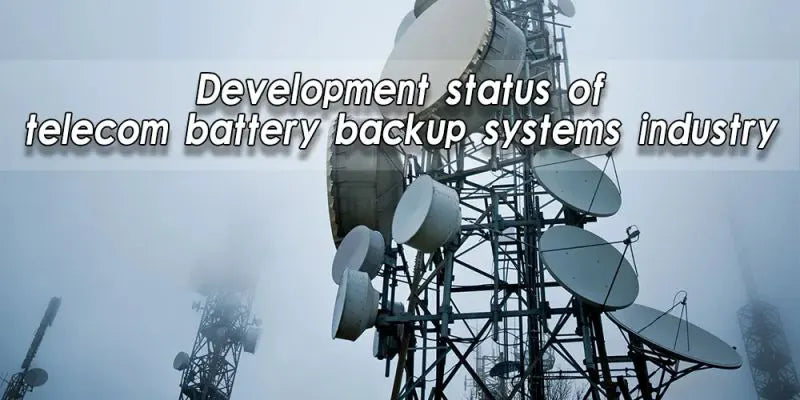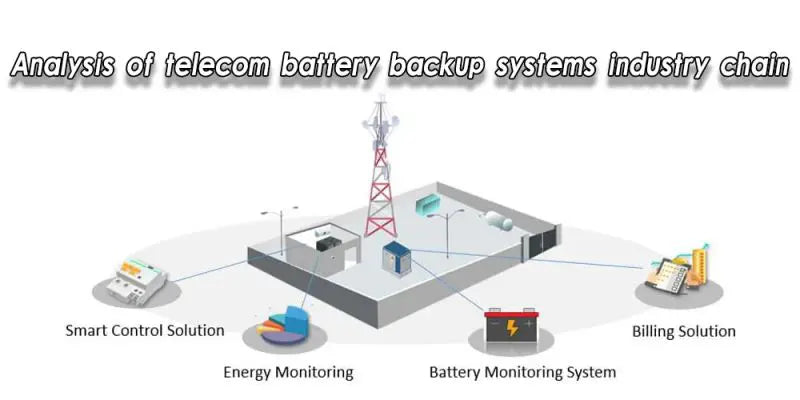
Main content:
Telecom battery backup systems mainly refer to communication energy storage products used for backup power supply of communication base stations. In recent years, China's communication energy storage industry has grown rapidly. In the future, it will still benefit from the vigorous construction of 5G communication base stations, and the market for telecom battery backup systems products is broad.
With the rapid increase in the penetration rate of lithium batteries such as lfp battery, ternary lithium batteries in the field of communication energy storage, in addition to traditional communication lead-acid battery manufacturers expanding the backup energy storage business for communication, many consumer and power lithium battery manufacturers have also set foot in this field.
1. What are telecom battery backup systems?
Telecom battery backup systems of communication base stations have high requirements on reliability and stability, so batteries are generally used as backup power to ensure continuous power supply. Due to the characteristics of mature technology, low cost, and wide operating temperature range, valve-regulated lead-acid batteries have become the mainstream technical route for backup power supplies of 4G base stations. However, after entering the 5G era, due to the substantial increase in power consumption of 5G base stations, it is difficult for the existing equipment room space and facilities to accommodate the huge expansion needs of backup power capacity.
Lfp batteries have high energy density, and has obvious advantages in safety, cycle life, fast charge and discharge, etc., which can reduce the demand for capacity expansion and transformation of mains power, and reduce construction and operation costs. Therefore, lithium iron phosphate batteries are accelerating to replace lead-acid batteries and become the mainstream technical route of base station telecom battery backup systems in the 5G era.

5G base stations are mainly divided into macro base stations and small base stations. Macro base stations are base stations built on iron towers. The base stations are large in size, wide in coverage area, and have the largest power. They require energy storage battery equipment to support them. Small base stations are small base stations installed in buildings or densely populated areas. The base stations are small in size and small in coverage area. They are used as a supplement to enhance the coverage of 5G base stations. Generally, they are directly powered by mains power without power storage equipment.
2. New applications of telecom battery backup systems
In the past year, the performance of China's telecom energy storage track was relatively weak, and it was the only field with negative growth among the four major energy storage tracks. According to data, the shipment of telecom battery backup systems batteries in 2022 will be 9GWh, a year-on-year decrease of 25%.
On the one hand, telecom battery backup systems batteries are mainly used for the backup power of the three major communication operators and tower communication base stations. The application scenarios are relatively simple, the frequency of use is not high, and the profit is low. On the other hand, China's telecom energy storage market is a typical bidding market. In 2022, due to the sharp rise in the price of upstream lithium mines, the demand for centralized procurement of telecom battery backup systems batteries in China will weaken.
In order to further broaden the application scenarios of telecom battery backup systems, explore new business models, and improve idle time efficiency, 5G base station energy storage systems can be connected to virtual power plants, participate in power grid frequency regulation, and realize profits.

In 2023, relevant Chinese government departments will further encourage the deployment of power-side and grid-side energy storage systems for peak-shaving and frequency-regulating demands of the power grid. In data centers, 5G base stations and other scenarios, deploy user-side energy storage according to local conditions. This measure will accelerate the integration of 5G base station energy storage systems into virtual power grids.
In general, the construction of telecom battery backup systems sites is relatively scattered. As China fully rolls out the construction of 5G base stations, the "idle time" of 5G base station sites may be intensified in the future. Therefore, accelerating the access of 5G base stations to the virtual grid will stimulate the aggregation effect of communication energy storage and broaden the application scenarios of telecom battery backup systems. In the future, communication energy storage may further participate in power system and electricity market transactions.
3. Development status of telecom battery backup systems industry
In recent years, China's telecom battery backup systems industry has grown rapidly. In the future, it will still benefit from the vigorous construction of 5G communication base stations, and the market for communication energy storage products is broad. According to statistics, China's energy storage lithium battery shipments will reach 16.2GWh in 2020, of which communication energy storage is 7.4Gwh, accounting for 46%; electric energy storage is 6.6Gwh, accounting for 41%. Others include lithium batteries for energy storage in urban rail transit, industry and other fields, accounting for 13%.
China's telecom battery backup systems lithium batteries are growing rapidly. According to statistics, the shipment of communication energy storage lithium batteries has increased from 1.7GWh in 2017 to 7.4GWh in 2020, with an average annual compound growth rate of 44.44%. 2018 is the beginning of the rapid development of China's telecom battery backup systems lithium battery industry.

On the one hand, Chinese communication operators began to purchase communication backup lithium batteries in batches in 2018. On the other hand, China Tower, a communication base station construction and maintenance company, announced that it will purchase all lithium batteries in the future. The rapid construction of 5G communication base stations has greatly driven the market demand for telecom battery backup systems products.
4. Analysis of telecom battery backup systems industry chain
The upstream of the industry is energy storage equipment and energy storage batteries, the midstream is the manufacturer of energy storage lithium battery products for communication, and the downstream is communication operators, builders and communication equipment integrators.
Upstream: energy storage equipment - battery management system
The energy storage equipment in the upper reaches of the industry is mainly battery management systems. Generally, battery manufacturers will independently develop supporting battery management systems, and there are also some companies that specialize in providing battery management systems. The application of China's battery management system (BMS) is mainly in the three major fields of new energy vehicles, energy storage and consumer electronics.
According to statistics, in 2020, new energy vehicles, energy storage and consumer electronics BMS will account for about 54%, 24% and 22% respectively. Compared with new energy vehicle BMS and consumer electronics BMS, energy storage BMS is still in the growth stage, and market competitors are gradually increasing. At present, competitors in the energy storage BMS market are mainly divided into two categories. One is energy storage lithium battery companies, which independently develop supporting BMS, such as BYD, Narada, etc.; the other is professional BMS companies.

Downstream: communication field
The downstream application of the industry is in the field of telecom battery backup systems, and the main body is communication construction operators and communication equipment integrators. In China, the only companies that can build 5G base stations are China Tower, China Telecom, China Unicom and China Mobile. In general, in the construction of 5G base stations, the 5G computer room, power supply and related supporting facilities are constructed by China Tower, and the installation of base station equipment and antennas is carried out by China Telecom, China Unicom and China Mobile.
For the lithium batteries of telecom battery backup systems for 5G base station backup power, China Tower, China Telecom, China Unicom and China Mobile will directly invite public bidding. Communication equipment integrators mainly provide comprehensive communication solutions for communication operators. In terms of telecom battery backup systems business, communication equipment integrators mainly provide Chinese communication operators with complete communication backup solutions by purchasing communication energy storage products from upstream and developing communication technologies by themselves.
Related articles: home energy storage, telecom batteries, top 5 energy storage BMS companies
















